As remote and hybrid work environments continue to shape the modern workplace, companies need unified platforms to manage HR, payroll, IT, and global compliance. Rippling has emerged as a leading all-in-one HRIS and workforce automation platform, combining global payroll, EOR (Employer of Record), IT device management, and app provisioning. It’s widely used by fast-growing tech companies and mid-sized enterprises for its deep integrations and automation workflows. However, as teams scale internationally and seek more flexible pricing, localized compliance, or specialized support, many businesses are actively exploring Rippling alternatives. From startups looking for lean EOR platforms to enterprises needing stronger benefits management or deeper regional coverage, the right alternative can better align with your growth and compliance goals.
Whether you’re hiring globally, expanding into emerging markets, or building a fully distributed team, this guide compares the top 8 Rippling competitors in 2025 to help you make an informed decision.
Table of Contents
- What Does Rippling Provide
- Why Consider Rippling Alternatives
- Top 8 Rippling Competitors & Alternatives in 2025
- Detailed Comparison of Top 8 Rippling Alternatives 2025
- What Are the Common Mistakes to Avoid When Choosing Rippling Alternatives
- How to Choose the Best Rippling Alternative
- Why Choose Asanify for Your Business Expansion
- FAQs
What Does Rippling Provide
Rippling is a cloud-based HR and IT platform designed to unify employee data, payroll, benefits, device management, and global hiring. It offers modular services—starting with core HRIS features and expanding into areas like international payroll, contractor onboarding, compliance management, and even finance tools.
Key strengths of Rippling include:
- Deep integrations with 500+ tools like Slack, QuickBooks, and Zoom
- U.S. PEO and international EOR add-ons
- IT management with device and app provisioning
- Payroll automation across global locations
- Smart workflows and custom dashboards
While Rippling provides powerful automation and customization, it may not be ideal for companies needing regional legal support, visa sponsorship, or affordable EOR options.
Why Consider Rippling Alternatives
Despite its strong feature set, many businesses consider Rippling alternatives due to the following limitations:
- Complex pricing: Base plans are affordable, but EOR add-ons and IT modules can raise the total cost quickly.
- Limited regional HR compliance: While Rippling supports EOR globally, it often lacks local legal advisory in emerging markets.
- Overhead for small teams: The platform is powerful but may feel heavy for early-stage startups or lean ops teams.
- Minimal immigration or visa support: Unlike platforms like Asanify or Remote, Rippling doesn’t specialize in relocation.
- Support responsiveness: Users report slower response times for legal clarifications or escalations.
Exploring alternatives allows companies to prioritize speed, regional expertise, budget-friendly pricing, or deeper EOR capabilities.
Top 8 Rippling Competitors & Alternatives in 2025
1. Asanify
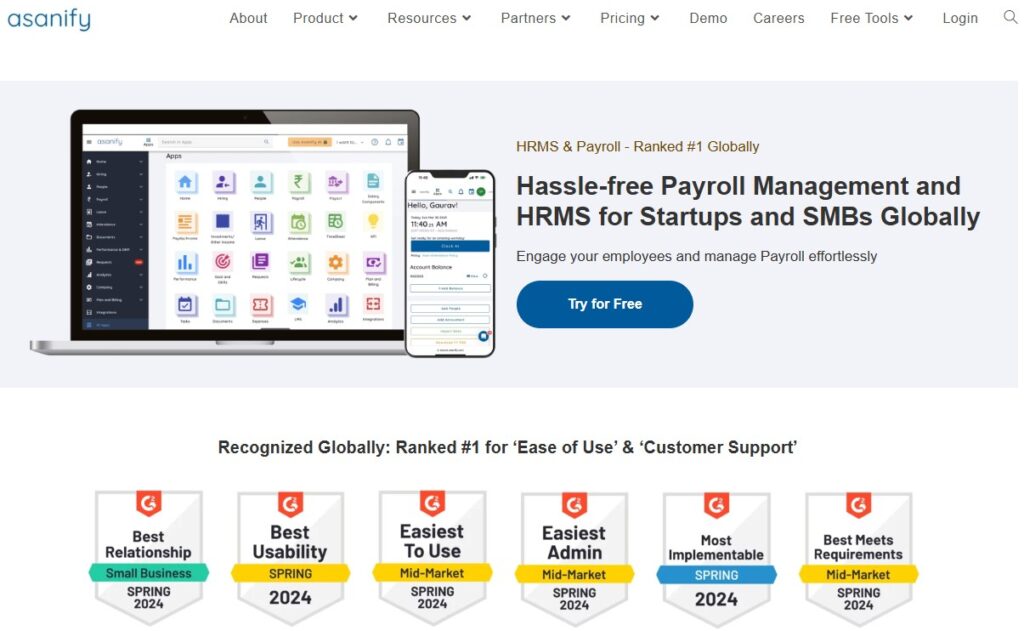
Build your globally distributed workforce with Asanify’s regionally focused EOR and payroll platform, tailored for emerging markets. Asanify enables companies to hire and manage full-time employees and contractors across India, Southeast Asia, the Middle East, and Eastern Europe—without needing to set up legal entities. Its deep local expertise, personalized support, and transparent pricing structure make it a top alternative to Rippling for businesses hiring in compliance-heavy geographies.
Key Features of Asanify:
- Full-Stack EOR Services: Includes onboarding, offer letters, payroll processing, documentation, exits, and offboarding.
- Fast Onboarding: Employees can be onboarded in 2–3 business days with localized contracts.
- Country-Specific Compliance: Specialized support for India, UAE, Singapore, Poland, and more.
- Custom Employment Documents: Offer letters, ESOP terms, and salary structures aligned to local labor laws.
- HR and Legal Advisory: Each client receives regional HR and legal guidance.
- Visa and Immigration: Support for employment visas, relocations, and international mobility.
- Localized Benefits: Tailored benefits like medical insurance, statutory perks, and ESOP planning.
- Multi-Currency Payroll: Salary disbursement and reimbursement in INR, AED, PLN, SGD, PHP, and more.
Pricing Structure of Asanify:
- EOR Services: $99–$399/month per employee depending on geography and salary slab
- Contractor Management: Starting at $25/month per contractor
- Visa & Immigration Support: Based on country and complexity
- No setup fees or withdrawal charges
Asanify’s Pros & Cons
| Pros | Cons |
| Strong in Asia, MENA, and Eastern Europe | Not available in the Americas |
| Transparent and affordable pricing model | Lacks native device management tools |
| Personalized HR and legal assistance | Fewer HRIS integrations than Rippling |
| Excellent benefits and tax optimization tools | Limited brand recognition (growing) |
2. Deel
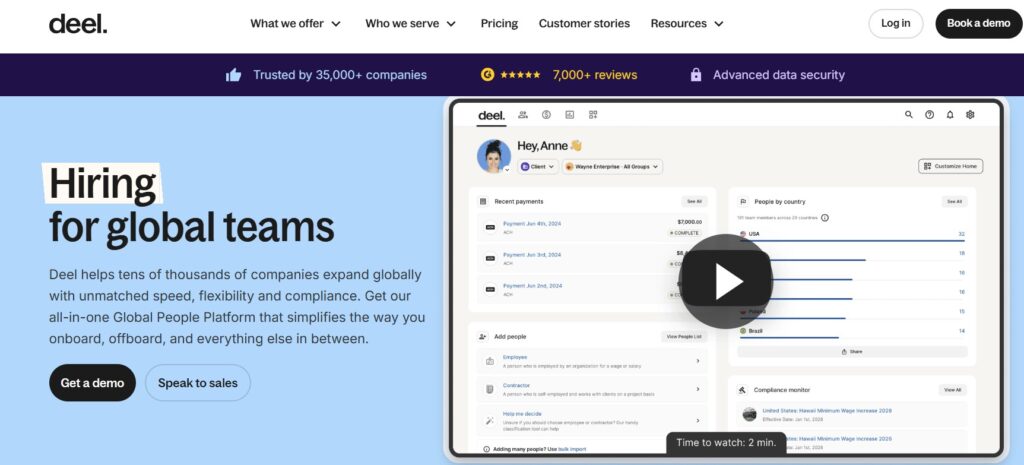
Deel is one of the most recognized platforms for managing international payroll and contractor relationships. It allows businesses to hire full-time employees or freelancers across 150+ countries using its proprietary infrastructure and partner network. Deel’s strong automation, integrations, and onboarding speed make it a compelling choice for teams looking to expand rapidly without building internal HR and legal expertise.
Key Features of Deel:
- Global EOR Coverage: Compliant hiring in over 150 countries.
- Contractor Onboarding: Fast invoicing and payment for international freelancers.
- Automated Payroll: Local tax filings, currency disbursement, and payment methods.
- Equity & Benefit Plans: Support for ESOPs, insurance, and retirement plans.
- Visa & Relocation Support: Limited to specific countries but available.
- Integration-Friendly: Compatible with BambooHR, QuickBooks, Xero, Workday, and more.
Pricing Structure of Deel:
- EOR Services: Starting at $599/month per employee
- Contractor Management: From $49/month per contractor
- Customizations: Additional fees may apply for terminations, currency conversion, etc.
Deel’s Pros & Cons
| Pros | Cons |
| One of the widest country coverages available | Additional charges for certain services |
| Self-serve platform with fast setup | Legal support can be less personalized |
| Ideal for startups and fast-growing companies | Limited customization in employment docs |
| Integrates well with HR and accounting tools | No IT or asset management tools |
3. Remote
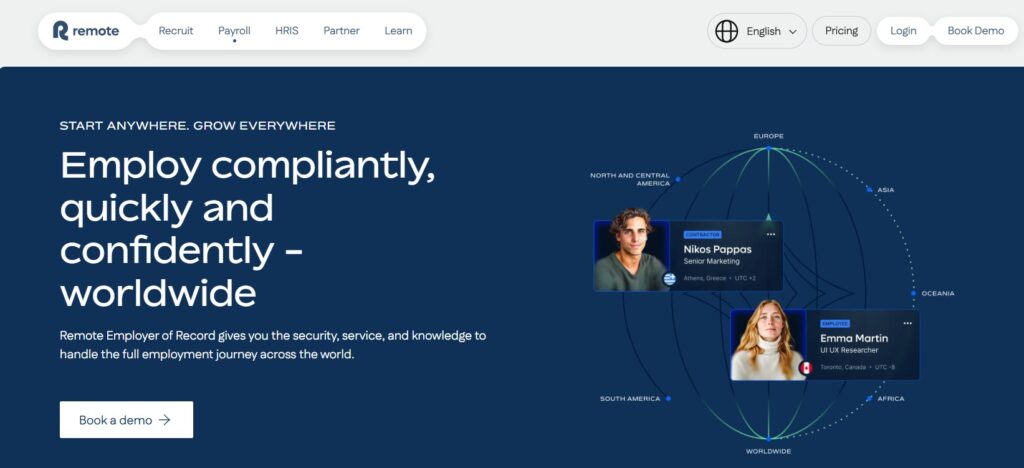
Remote is a full-service global employment platform that helps businesses hire employees in over 80 countries using its own legal entities. It’s especially strong in data privacy (GDPR), IP protection, and equity management—ideal for companies prioritizing transparency, data security, and legal control.
Key Features of Remote:
- Entity-Owned EOR Model: Avoids third-party dependency, ensuring better legal accountability.
- Data & IP Protection: Full compliance with GDPR and IP assignment laws.
- Stock Option Management: Equity platform to offer and manage global employee stock plans.
- Localized Benefits & Contracts: Country-specific terms that reduce legal exposure.
- Flat-Rate Pricing: Simple, no-surprise pricing model that supports planning and scaling.
Pricing Structure of Remote:
- EOR Services: $599/month per employee
- Contractor Management: From $29/month per contractor
- Discounts: Available for annual plans and volume hiring
Remote’s Pros & Cons
| Pros | Cons |
| Fully owns entities in 80+ countries | Slightly higher base pricing than competitors |
| Strong in equity, IP, and data protection | Fewer benefits customization options |
| Transparent and flat pricing | Slower onboarding in newer regions |
| Great UI/UX and employer dashboards | Limited HR/IT integration features |
4. Multiplier
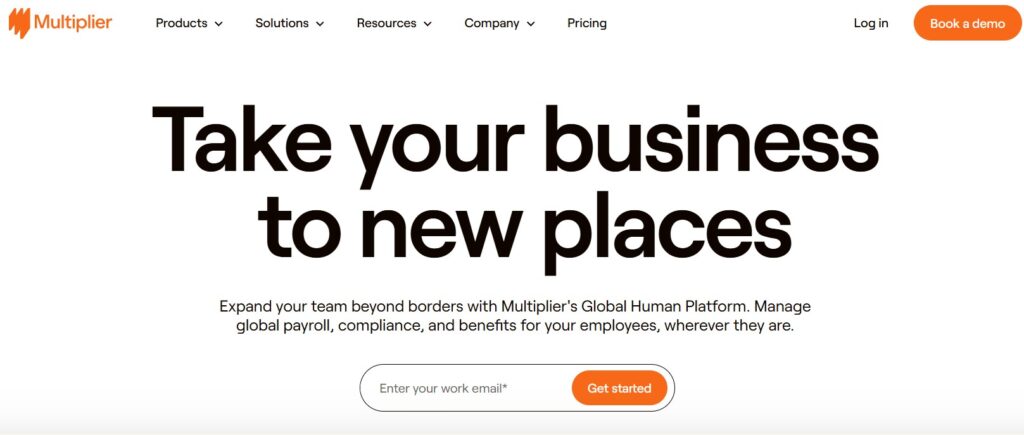
Multiplier helps companies onboard and pay employees in 150+ countries without setting up a legal entity. The platform also offers unique features like cost forecasting tools and IP protection, making it a great fit for fast-scaling startups needing control and transparency across multiple hiring models.
Key Features of Multiplier:
- EOR and Contractor Support: Supports both full-time and freelance models.
- Cost Estimation Engine: Predict total cost of employment by role and geography.
- Localized Contracts and Benefits: Customized per country for compliance.
- IP Protection and NDAs: Secure employment and protect proprietary work.
- Benefits Marketplace: Choose from health, dental, life insurance, and more.
Pricing Structure of Multiplier:
- EOR Services: $400–$600/month per employee
- Contractor Plans: Custom pricing based on geography
- Volume Discounts: Available for multi-region rollouts
Multiplier’s Pros & Cons
| Pros | Cons |
| Modern interface and intuitive setup | No IT provisioning or HR automation |
| Quick contractor-to-employee transition | Limited support for complex equity plans |
| Real-time cost forecasting | Smaller in-house legal advisory team |
| Competitive pricing for APAC/MENA hires | Fewer integrations than Rippling |
5. Skuad
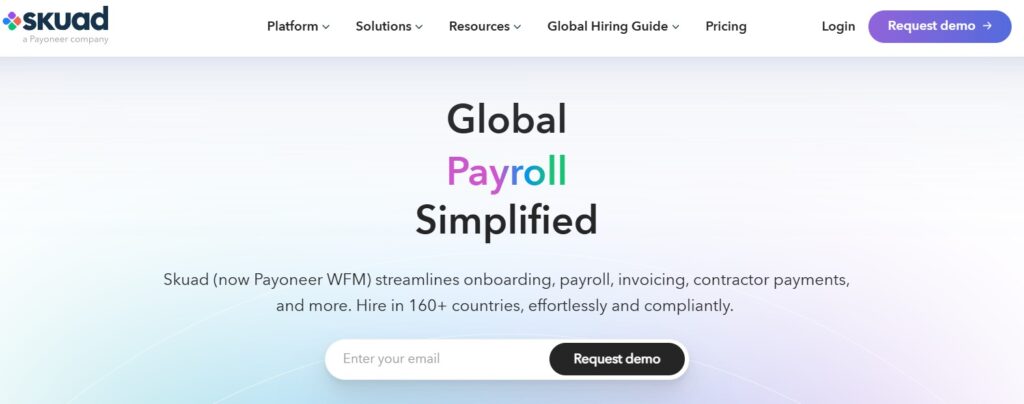
Skuad provides an affordable global employment platform that enables fast onboarding and compliance for teams in 160+ countries. It’s ideal for startups and growing businesses looking to expand into emerging markets with a lean, clean, and easy-to-use interface.
Key Features of Skuad:
- Global EOR: Hire legally in multiple countries with auto-generated compliant contracts.
- Localized Payroll & Tax: Country-specific salary disbursement and deductions.
- Benefits and Statutory Compliance: Configurable per country.
- Team Dashboard: Central panel for tracking onboarding status and compliance docs.
- Integrated Timesheets: For both employees and contractors.
Pricing Structure of Skuad:
- EOR Services: From $399/month per employee
- Contractor Management: From $29/month per contractor
- Customized Enterprise Plans: Available
Skuad’s Pros & Cons
| Pros | Cons |
| Budget-friendly EOR pricing | Smaller partner and integration ecosystem |
| Quick onboarding across emerging markets | Lacks IT device and app provisioning |
| Streamlined HR dashboard | Limited visa and mobility capabilities |
| Contractor and employee tools in one system | Not ideal for highly complex compliance |
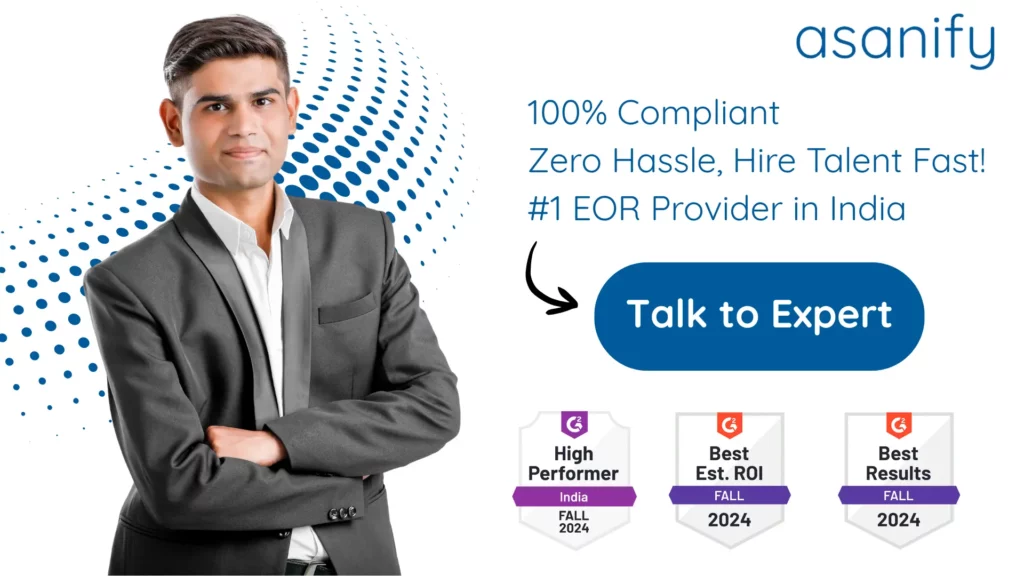
6. Papaya Global
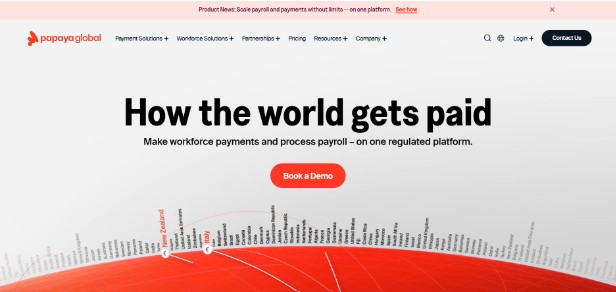
Papaya Global is a payroll and workforce management platform built for compliance-heavy enterprises. Its strength lies in AI-powered dashboards, real-time reporting, and a secure infrastructure suitable for global operations with high regulatory standards.
Key Features of Papaya Global:
- Global Payroll Engine: Consolidated and automated payroll in 160+ countries.
- Real-Time Compliance Engine: Flags compliance risks and discrepancies.
- Enterprise Security: SOC 2, ISO, GDPR compliant infrastructure.
- Contractor and Temp Worker Support: Built-in workflows for freelancers.
- Integration Library: Connects with ERPs, finance platforms, and HR systems.
Pricing Structure of Papaya Global:
- EOR Services: Starts at $650/month per employee
- Contractor Management: Volume-based custom pricing
- Advanced Analytics: Included with enterprise tiers
Papaya Global’s Pros & Cons
| Pros | Cons |
| Strong analytics and compliance controls | Premium pricing, especially for SMBs |
| Secure, enterprise-ready infrastructure | Limited customization for startups |
| Wide integration support | Complex UI for small HR teams |
| Scalable across 160+ countries | No visa or immigration support |
7. Oyster HR
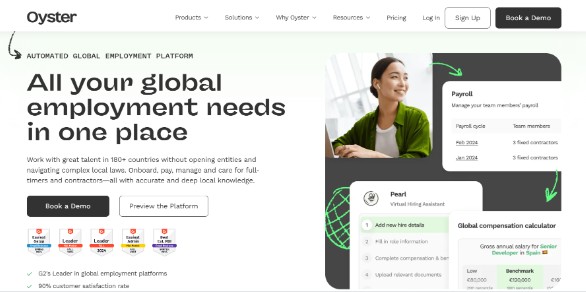
Oyster HR helps remote-first companies seamlessly hire and pay talent around the world, offering built-in tools for compliance, benefits administration, and equity management. Designed specifically for distributed teams, the platform delivers a user-friendly experience with localized benefits tailored to each country. Thanks to its automation-driven approach, onboarding employees and contractors across 180+ countries becomes a fast and scalable process.
Key Features of Oyster HR:
- EOR & Contractor Services: Hire in 180+ countries with built-in legal support
- Global Payroll & Benefits: Country-specific insurance and PTO tracking
- Multi-Currency Payments: Automated global salary disbursement
- Document Storage: Digital contracts and HR files in one place
- Built-in Leave Management: Centralized time-off tracking
Pricing Structure of Oyster HR:
- EOR Services: $599–699 per employee/month
- Contractor Management: $29 per contractor/month
- Global Payroll Add-on: $25 per employee/month
- Security Deposit: One month’s fee (refundable)
Oyster HR’s Pros & Cons
| Pros | Cons |
|---|---|
| Strong for distributed, remote-first teams | Requires upfront deposit |
| Automated onboarding and compliance | No phone or live chat support |
| Wide country coverage (180+) | Dependence on third-party partners |
| Simple UI for growing teams | Delayed payments in certain geos |
8. Globalization Partners
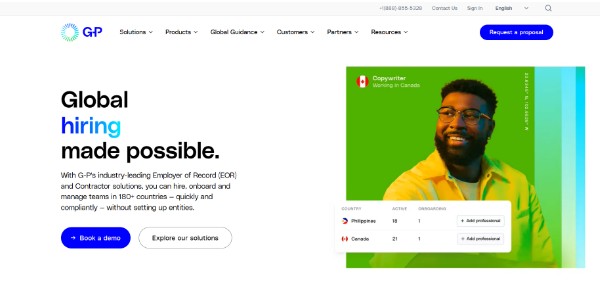
Globalization Partners (G-P) is a leading global EOR platform designed for mid-size to large enterprises. It excels in enterprise-grade compliance, localized onboarding, and international HR operations across 180+ countries.
Key Features of Globalization Partners:
- Global EOR Infrastructure: Legal employment without local entities
- Visa & Immigration Services: Full cross-border mobility support
- Localized Benefits Setup: Country-specific statutory and supplemental perks
- Enterprise Legal & Tax Teams: Dedicated support for each client
- Data Security & Risk Controls: SOC 2, ISO 27001, GDPR compliance
Pricing Structure of Globalization Partners:
- Premium enterprise pricing (custom quote)
- Tailored contracts and SLAs for larger hiring volumes
Globalization Partners’ Pros & Cons
| Pros | Cons |
| Strong global compliance and legal backing | Premium price point not ideal for startups |
| Suitable for complex enterprise environments | Onboarding may take longer for small teams |
| Full immigration and relocation assistance | Less flexible for smaller, agile teams |
| Operates in 180+ countries | Platform is more rigid than others |
Detailed Comparison of Top 8 Rippling Alternatives 2025
| Provider | G2 Rating | Starting Price | Strengths |
| Asanify | 4.8/5 | $99–$399/month | EOR for Asia/MENA with visa and ESOP support |
| Deel | 4.6/5 | $599/month | Global reach and strong contractor tools |
| Remote | 4.5/5 | $599/month | Own-entity EOR model and GDPR-first approach |
| Multiplier | 4.7/5 | $400–$600/month | Contractor conversion and regional payroll |
| Skuad | 4.4/5 | From $399/month | Affordable EOR and clean UI for fast onboarding |
| Papaya Global | 4.2/5 | $650/month | Enterprise-level payroll and analytics |
| Andela | 4.3/5 | Custom | Curated tech talent from Africa and LATAM |
| Globalization Partners | 4.6/5 | Premium (custom quote) | Enterprise compliance, visa, and legal expertise |
What Are the Common Mistakes to Avoid When Choosing Rippling Alternatives?
While comparing Rippling alternatives, many companies fall into the trap of selecting platforms based solely on price or automation features. Here are a few critical mistakes to avoid:
- Overlooking local compliance needs: Ensure your provider offers strong regional expertise, not just general legal templates.
- Focusing only on integrations: Rippling excels in automation, but integrations alone can’t replace robust HR or legal support.
- Assuming all platforms include visa support: Immigration services vary widely—confirm what’s included if you’re hiring internationally.
- Ignoring support availability: Fast response time matters. Test customer support before committing, especially for legal escalations.
Not evaluating contractor vs. employee workflows: If you work with both models, choose a platform that transitions seamlessly.

How to Choose the Best Rippling Alternative?
Evaluating the best Rippling alternative depends on your business size, global reach, and hiring structure. Ask yourself:
1. Are you looking for unified HR+IT, or only global employment?
If your primary goal is workforce automation and IT device provisioning, Rippling may still be hard to beat. But for purely global hiring, platforms like Asanify, Deel, or Remote offer deeper EOR support.
2. Do you need fast onboarding or stronger regional compliance?
If speed is your priority, Multiplier or Skuad offers fast EOR setup. If compliance in India, UAE, or Poland is key, Asanify stands out with tailored contracts and legal advisors.
3. Will you offer benefits, ESOPs, or handle relocation?
Choose a platform that supports custom perks and full immigration handling. Deel and Asanify offer these, while Rippling does not specialize in this area.
4. Are cost transparency and flexibility important?
Rippling’s modular pricing can add up quickly. Consider alternatives like Remote or Asanify for more predictable, all-inclusive EOR pricing.

Why Choose Asanify for Your Business Expansion?
Asanify is the ideal Rippling alternative for companies hiring in Asia, MENA, and Eastern Europe. It goes beyond payroll and automation—offering region-specific legal expertise, immigration support, and benefits customization tailored to each country’s labor laws.
Here’s why global teams prefer Asanify over Rippling:
- Full compliance and EOR support in emerging markets
- Transparent flat-rate pricing with no hidden charges
- Custom onboarding documents, ESOP plans, and tax optimization
- Visa sponsorship for cross-border hiring
- Dedicated HR and legal specialists for each geography
For companies expanding into India, UAE, Singapore, or Poland, Asanify delivers what Rippling cannot—local insight, faster onboarding, and personal support without enterprise-level costs.
FAQs
Asanify, Deel, Remote, and Multiplier are among the best options for EOR, payroll, and contractor management across multiple regions.
Yes, but its global EOR is an add-on and may lack country-specific compliance and immigration support found in platforms like Asanify or Remote.
Asanify provides stronger regional expertise, faster onboarding, and custom legal documentation for Asia and MENA markets.
It can be, but its complexity and modular pricing make it more suitable for mid-size and larger enterprises. Startups may prefer platforms like Skuad or Asanify.
Asanify, Deel, and Globalization Partners offer immigration assistance and mobility support, which Rippling does not natively include.
Yes, but with limited customization. Remote, Asanify, and Papaya Global offer more flexible equity and benefits structuring per region.
Rippling is powerful but not deeply specialized in global legal compliance or regional tax structuring—key areas where alternatives like Asanify or Remote excel.
Not to be considered as tax, legal, financial or HR advice. Regulations change over time so please consult a lawyer, accountant or Labour Law expert for specific guidance.



